Class II
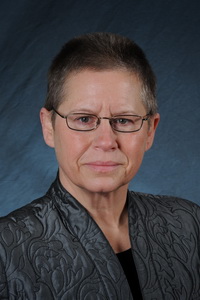
The late Diane Berry
Former Jane Sox Monroe Distinguished Professor, School of Nursing
Realizing the importance of designing an intervention that met the needs of the Spanish-speaking community in North Carolina, Diane Berry used community-based participatory research to develop a weight management and diabetes prevention program for the Spanish-speaking population in Orange and Durham counties. Over a three-year period, Berry refined, adapted, translated and tested a weight management intervention designed for Spanish-speaking women and their young children. Berry’s program gave voice to her work with the Hispanic community while also engaging community resources for a successful outcome.
“My life has been forever changed and enriched through the individuals I have met during this journey. Collaboration within the Faculty Engaged Scholars program provided a strong foundation to understand the importance of engaged scholarship and public service.”
Diane Berry tribute in The Well
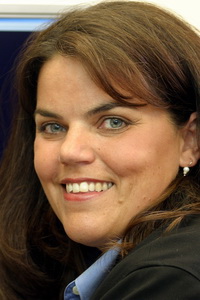
Karen Erickson
David E. & Dolores Yoder Distinguished Professor, Allied Health Sciences, Speech and Hearing Sciences
What started as a small, school-based project has transformed into a district initiative. In November 2008 Karen Erickson began implementing Jim Cunningham’s Whole-to-Part reading model in grades three to five in Orange County’s Efland-Cheeks Elementary School. After 10 weeks of daily intervention, students in the model showed growth in their area of need and district level administrators decided to adopt the intervention throughout the district, grades three to eight for the 2009-2010 school year. Currently, 800 students are being served district-wide by interventionists including counselors, PE and elective teachers, literacy coaches, reading specialists, content-area teachers and ESL/EC/AIG resource teachers. Erickson continues to meet monthly with Efland-Cheeks for staff development and PLC consultation as well as provide district-wide monthly professional development to interventionists, administrators and literacy coaches. Current mid-year data show that students have grown an average of one year in their greatest area of need. In this project, Erickson, a reflective practitioner with a passion for aligning research and practical classroom application, brought research assistants with her to help engage in action to close the achievement gap for all students. Her project, supported in part by the UNC School of Medicine, represents the true mission of Carolina as a research University serving the people of North Carolina.
“Participating in the Faculty Engaged Scholars program gave me a language to use in describing the scholarship that has been integral to my career. It has also been invaluable in helping me connect with colleagues across campus and throughout North Carolina who value research that comes from and is sustained by the community.”
For current information on Karen Erickson, visit her faculty page.
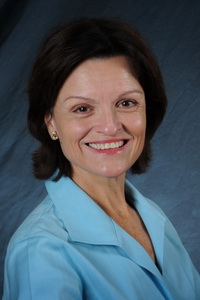 Suzanne Gulledge
Suzanne GulledgeClinical Professor, School of EducationIn an effort to help middle-school students at risk of failure in Durham, Orange and Caswell Counties, Suzanne Gulledge developed the ACES (Academic Curriculum Enrichment Students) project. This initiative brings together teachers in training and university students in other majors who have an interest in education. These students participate in service-learning projects as tutors and mentor to help middle-school students address the critical foundations of academic success in core academics.
Through the Faculty Engaged Scholars program (FES Program), Gulledge advanced her commitment to experiential education to bring a project to life. Sessions with other scholars, staff and invited guests helped her develop an approach appropriate to prepare and train teachers. Intellectual stimulation combined with community-based experiences served as the impetus needed to shape an initiative that extended work from Durham and Orange counties to rural Caswell County. Involvement with the FES program inspired and prepared Gulledge to continue this project as well as extend it into study abroad programs in the School of Education. Engagement and experiential education have the power to enhance the kind of learning that embraces service and advances social justice.
“Through the program I have realized a vision I’ve had for a long time; and, what I am most excited about are the new dreams, inspiration and energy I have for my future scholarly and professional work. I am very proud and grateful to have been selected as a Faculty Engaged Scholar.”
For current information on Suzanne Gulledge, visit her faculty page.
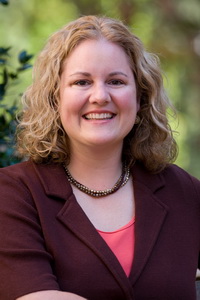
Rebecca Macy
Professor, School of Social Work
Rebecca Macy developed interventions with women and children who are survivors of domestic violence, to promote their well-being and prevent re-victimization. MOVE Evaluation, a community-based, four-year research study on the effectiveness of the Mothers Overcoming Violence through Education and Empowerment (MOVE) Parent-Child Intervention. MOVE is a collaborative effort between Wake County human services agencies InterAct and SAFEchild. InterAct provides domestic violence prevention services and SAFEchild provides child abuse prevention services. Together these agencies offer a 13-week parenting program for female domestic violence survivors in conjunction with therapeutic support group services for their children. Preliminary study results suggest mothers who are domestic violence survivors may be reluctant to allow data collected about their children. However, this data is critical for determining the effectiveness of the children’s therapeutic support group services. Macy’s engaged scholarship project, supported in part by the UNC School of Social Work, enabled her to collect additional information from the mothers about what data should be collected, preferred means for researchers to approach the logistics, and how best to collect data from children age 5 and under. Macy’s research team will use the information gained from this additional study to modify and improve their current research efforts, and develop data collection protocols for future studies with children affected by domestic violence.
“The Faculty Engaged Scholars program has given me a unique and important opportunity to learn theories, frameworks and strategies that have enhanced my community-based and collaborative research. The program also offered me the opportunity to network with smart, creative and delightful UNC colleagues who are also conducting engaged scholarship. I have learned a tremendous amount from my colleagues over these past two years. And I have been inspired by their dedication and passion. I have no doubt that I will keep up with these contacts for the rest of my career.”
For current information on Rebecca Macy, visit her faculty page.
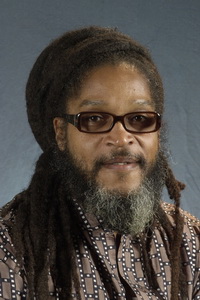 Charles Price
Charles PriceAssociate Professor of Anthropology, College of Arts and SciencesOral histories as learning tools and self-assessment practices may not appear to be likely partners, but for Charles Price, this combination proved successful with community organizations. Drawing from experiences and analyses of working with community-based organizations across the nation, Price developed the Documentation, Learning, Action (DLA) Process. He partnered with Highlander Research & Education Center on an organizing initiative called THREADS. Response to the DLA strategy has been positive and Price is currently collaborating with the Denver Public School System and the University of Denver in a planning project focused on assisting in the development of an authentic community participation and engagement dimension in Denver Public High School reform using the DLA strategy.
“The Faculty Engaged Scholars program provided me a special and valuable learning community. I had the opportunity to sit with respected scholars who are exemplars of the craft of engaged scholarship. Importantly, these scholars represented many different fields and disciplines, demonstrating the diversity of approaches to engaged scholarship. One of my take aways’ from my experience is the significance of engaged scholarship to the mission of 21st century institutions of higher education. We must practice our scholarship and tackle head-on the pressing problems of the world.”
For current information on Charles Price, visit his faculty page.
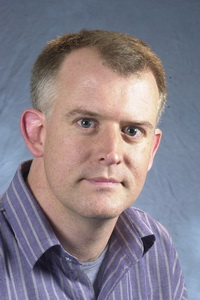
Andrew Reynolds
Former Professor, Political Science, College of Arts and Sciences
Do African-Americans, Latinos, Asian-Americans and Native Americans feel they are adequately represented in state and local government in North Carolina? Andy Reynolds asked that exact question in his study. Drawing from a database of 635 minority representatives from the over 4,000 elected representatives in the state of North Carolina, Reynolds asked four questions: Are there sufficient numbers to adequately represent communal interests? To what degree do such groups feel their voices are heard in legislative bodies? How do the electoral systems used effect the numbers and nature of minority legislators elected? What alternative election systems might do a better job at representing North Carolina’s growing minority communities? When it comes to minority representation, among the 4,000 plus elected representatives in North Carolina, 609 are African-Americans (16 percent), there are 23 Native Americans (0.6 percent), three Latinos (0.08 percent) and no Asian-Americans, as of 2008-2010.
“The Faculty Engaged Scholars program has transformed my scholarship and relationship with the state. It opened my eyes to new ideas and cases. Above all it has connected me to some of the most fascinating and inspirational members of the UNC and broader Carolina community.”
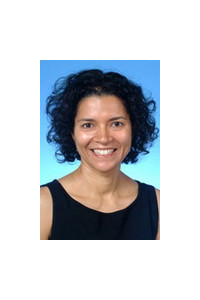 Sohini Sengupta
Sohini SenguptaFormer Research Coordinator, Center for Faculty Excellence
Collaboration and a multi-disciplinary approach are what drove Sohini Sengupta’s project – a complete evaluation of domestic violence services offered through UNC Hospital’s Beacon Family and Child Program. Focusing on the collaborative relationship between the UNC Office of the Vice Chancellor for Research and Economic Development and UNC Hospitals, Sengupta was able to enhance engaged scholarship with a community partner and delve into domestic violence research. Research included three levels of data collection to understand screening and response to domestic violence at the clinic level; Beacon’s preparedness and satisfaction with Beacon’s service at the UNC Health Care provider level; UNC Health Care providers’ knowledge, attitudes, and behaviors associated with their approach to addressing domestic violence in clinical care settings; and the types of services Beacon has offered to UNC Health Care patients in a retrospective 12-month period. This project, supported in part by the UNC School of Medicine, is in the data collection phase and is projected to have findings that will help improve the program.
“The scholars in the Faculty Engaged Scholars program are role models for the types of engaged scholarship being done throughout campus.”
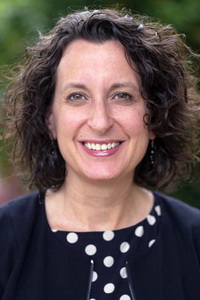
Aimee Wall
Professor, Government
Aimee Wall, professor of public law and government, coordinates the UNC School of Government’s educational programs for new North Carolina legislators and legislative staff. She serves as the school’s faculty liaison with legislators and other state-level policymakers. Her research focuses on various aspects of human services law, including public assistance programs; abuse and financial exploitation of the elderly; public guardianship; and the organization, administration and governance of local human services agencies. She also conducts research on the laws governing city and county animal control programs. Her work as a Faculty Engaged Scholar’s work focused on developing a facilitated discussion model for using legal, qualitative and quantitative research to support North Carolina’s local governments as they evaluated changing the way their county human services agencies would be organized and governed.
For current information on Aimee Wall, visit her faculty page.
